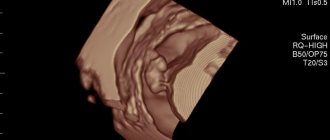Every woman's pregnancy experience is unique. Of course, not all women have the same symptoms or even the same signs from one pregnancy to the next.
And because early signs of pregnancy often mimic symptoms that may occur before and during menstruation, a woman may not realize she is pregnant.
In this article, we will look at various symptoms and signs that may indicate a possible early pregnancy.
When might the first signs of pregnancy appear?
This may seem strange, but in obstetrics the gestational age is counted from the last day of menstruation.
The main signs of pregnancy starting from the 1st obstetric week:
| Signs and symptoms | Weeks (from missed cycle) |
| moderate cramping and discharge | 1-4 |
| fatigue | 4-5 |
| nausea | 4-6 |
| tingling or chest pain | 4-6 |
| frequent urination | 4-6 |
| bloating | 4-6 |
| seasickness | 5-6 |
| mood swings | 6 |
| temperature changes | 6 |
| high blood pressure | 8 |
| severe fatigue and heartburn | 9 |
| cardiopalmus | 8-10 |
| breast and nipple changes | 11 |
| acne | 11 |
| noticeable weight gain | 11 |
Let's take a closer look at the 10 most common early pregnancy symptoms. It is important to know that these symptoms can not only be caused by pregnancy, but can also be associated with various health conditions. Therefore, the presence of these symptoms does not necessarily indicate that you are pregnant.
Breast augmentation
A couple of weeks after conception, a girl may notice breast swelling and pain on palpation. Every touch becomes unpleasant and painful. However, there are also those girls who cannot feel any changes and can calmly touch their chest. This usually lasts for several weeks, after which everything returns to normal. Women can often confuse the appearance of menstruation with a similar symptom. If a woman's nipples darken, this is an indisputable sign of pregnancy.
Delayed menstruation (missed menstrual cycle)
With a normal menstrual cycle with ovulation on days 14-15, a delay occurs 2 weeks after conception, since after the end of implantation of blastocytes, human chorionic gonadotropin (hCG) is produced, which helps the body maintain pregnancy, and the ovaries stop releasing mature eggs. But it is worth noting that a missed cycle is not always caused by pregnancy; it is better to confirm this with a pregnancy test, especially if you have an irregular cycle for some reason. In addition, you need to know that some women may experience bleeding during pregnancy. If you are pregnant, ask your doctor about bleeding as a natural process and as a sign of an emergency.
Most home tests can detect hCG as early as 8 days after a missed cycle.
Clue
- Take a pregnancy test.
- If the result is positive, call your doctor to schedule your first appointment.
- If you are taking any medications, ask your doctor if they pose any risk to you and your unborn baby.
In addition to pregnancy, there are various reasons why a delay may occur, such as sudden weight gain or loss. Fatigue, hormonal problems, stress - all this can contribute to cycle disruption. Some women experience a delay when they stop taking birth control.
Changes in sensations during pregnancy
Many women do not associate the first signs of pregnancy with a missed period in any way. They begin to feel symptoms that resemble those of a cold: general malaise;
- headaches (read why headaches cause reasons other than pregnancy);
- rhinitis, sore throat and cough (the treatment of ARVI is described here);
- frequent changes in pressure;
- chills followed by fever.
This condition can accompany a pregnant woman already in the second week after conception. Sudden fainting and dizziness often aggravate the situation. Cold symptoms are due to the fact that a woman’s immunity has not yet adjusted to bearing a fetus.
Nausea, frequent mood swings, rapid fatigue - all this is associated with the physiological transformation occurring in the body of a pregnant woman. In addition, early stages may be characterized by the following external manifestations:
Doctor's advice
Pregnancy planning must be approached responsibly in order to provide the developing baby with everything for his future successful life. Every pregnancy should be planned and after appropriate preparation. When a woman decides that she wants to become a mother, it is imperative to visit a gynecologist for further examination and start taking the necessary medications (folic acid 400 mcg once a day for both partners 3 months before the expected pregnancy)
Olga Zorina Pregnancy and childbirth, Gynecologist, Gynecologist-endocrinologist
- slight swelling of the hands and face;
- the appearance of acne (consult a dermatologist);
- bloating;
- darkening of the skin around the nipples.
Feelings are often deceiving. Recognizing conception as a cold or other illness and taking medications can have a detrimental effect on the embryo. Therefore, at the slightest suspicion of pregnancy, even before a missed period, you can use methods to establish pregnancy at its earliest stage.
Fatigue
Feeling tired can develop at any stage of pregnancy and is quite normal, but it is very common in early pregnancy. Fatigue and drowsiness can cause an increase in the level of the hormone progesterone. Of course, you can't rule out other factors that contribute to fatigue, such as low blood sugar, increased blood production or low blood pressure.
Clue
- Try to get enough sleep and maintain a rest routine.
- Ventilate the room before going to bed and spend time in fresh air often - this can help.
- Eat foods rich in protein and iron.
Breast changes: tingling, pain, growth
Breast changes may appear between the 4th and 6th weeks. Due to changes in the level of female hormones, the breasts may become swollen or tingling. Women may feel that their breasts are heavier or fuller, and may also experience increased sensitivity. This usually goes away after a few weeks as the body gets used to the hormones.
Nipple and breast changes may also occur at 11 weeks. Hormones promote breast growth. The areola, the area around the nipple, may change to a darker color and become larger.
Keep in mind that it will take a few weeks for your body to get used to the hormonal changes.
Clue
- You can reduce sensitivity in your breasts by purchasing a comfortable maternity bra. A cotton bralette is often the most comfortable
- It is better to choose one bra with different levels of clasps, with which you can adjust the size in the coming months
- Invest in breast pads, such as bamboo pads, that are inserted into your bra to reduce friction and nipple pain.
Cramps and discharge
The body of a pregnant woman at 1-4 weeks begins to change at the cellular level. A blastocyst (a group of cells on days 5-6 of embryo development), created from a fertilized egg, will subsequently form into the body parts and organs of the child.
After about 10 to 14 days (week 4), the blastocyst will implant in the endometrium, the lining of the uterus, which can cause implantation bleeding, which some women mistake for a light menstrual cycle, which usually lasts 3 to 12 days after the egg is fertilized.
4 common signs of implantation bleeding:
Pain. The pain may be mild, moderate, or severe. According to a study of 4,539 women, 28% of women attribute their discharge and light bleeding to pain1.
The color of the discharge can vary from pink or red to brown, which is normal.
Bleeding. Bleeding is usually compared to a normal menstrual cycle.
Episodes. Implantation bleeding may last less than 3 days and does not require treatment.
Implantation bleeding cramps resemble menstrual cramps, so some women mistake them and the presence of bleeding for the start of their menstrual cycle.
Also, a pregnant woman may notice white or milky vaginal discharge, which appears due to thickening of the vaginal walls, which begins almost immediately after conception. The growth of cells lining the vagina causes a discharge. These discharges are not dangerous, do not require treatment and can accompany a woman throughout her pregnancy.
Advice. If you experience a foul odor associated with your discharge, or a burning or itching sensation, be sure to tell your doctor so he can check for a bacterial or yeast infection.
Changes in the body during pregnancy at the physiological level
Pregnancy involves a number of physiological changes in the pregnant woman's body. And they begin from the very first days of fertilization.
Why do physiological changes occur?
The main task of physiological changes throughout the entire period of gestation is to create beneficial conditions for the health of both the mother and the unborn child. These include:
- providing the fetus with a sufficient amount of oxygen and nutrients;
- normal excretion from the female body of the elements of the life activity of the unborn child;
- preparing the mother’s body systems for the birth of the baby and its feeding.
The very first signs of pregnancy before a missed period are associated with the production of a hormone responsible for its maintenance. The formation of the placenta, umbilical cord, and fetal cardiovascular system stimulate intense blood flow to the uterus and serious hormonal changes.
Moreover, changes occur in all systems of the body.
Nausea and vomiting
Morning sickness usually occurs between 4 and 6 weeks and, despite its name, can occur not only in the morning, but at any time of the day or night. There is no scientific basis for what exactly causes nausea, but hormones are definitely involved.
During the first trimester of pregnancy, many women experience morning sickness, which can range from mild to moderate to severe. May become more intense towards the end of the first trimester and often subsides by the beginning of the second trimester.
Morning sickness is probably the most well-known early sign of pregnancy, but not every pregnant woman experiences it!
Also, some pregnant women change their taste preferences: they either crave or have an aversion to certain foods so much that even the thought of what was once a favorite dish can cause a gag reflex.
Some women experience vomiting, nausea, cravings and food aversions throughout their pregnancy. But in most cases, these symptoms decrease around 13-14 weeks of pregnancy.
Clue
- Keep a bag of saltine crackers by your bed and eat a few before you get up in the morning.
- Drink plenty of water and stay hydrated
- Call your doctor if you cannot keep liquid or food down in your stomach.
Be sure to eat a healthy diet to ensure you and your developing baby get the nutrients they need. You can seek advice on this from your doctor.
Temperature fluctuations
A sign of pregnancy on the 27th day of the cycle (negative test) is a change in temperature. Or rather, the fact that it begins to decline sharply, and then returns to normal again. Often it is the temperature measurement chart that can confirm or deny pregnancy. The test can be repeated again after some time. This happens due to the fact that progesterone begins to be produced intensively, which raises the temperature.
In the second phase, the temperature drops, and when pregnancy occurs, progesterone is produced again, this affects the temperature. Also, during pregnancy, the production of estrogen begins, which lowers this very temperature. It is precisely because of the opposition of these two hormones in the blood of a pregnant woman that the graph can fall. If the temperature stays around 37 degrees, then pregnancy is obvious. This temperature can persist in the first weeks of pregnancy, before the placenta begins to perform its function.
A consequence of an increase in temperature can be considered an increase in heart rate, even if the physical activity was small, for example, climbing stairs to a small height. Usually shortness of breath can be added to this; this occurs due to the fact that the lungs do not have enough air for the mother and child. Weakness may also increase.
High blood pressure and dizziness
Blood pressure usually drops in the early stages of pregnancy. This may cause dizziness due to dilation of blood vessels.
High blood pressure during pregnancy is more difficult to detect. Almost all cases of hypertension during the first 20 weeks indicate health problems not related to pregnancy.
During your first visit to your doctor, he or she will take your blood pressure to help establish a baseline for a normal blood pressure reading.
Clue
- Do pregnancy-friendly exercise if you don't already.
- Learn how to regularly monitor your blood pressure
- Ask your doctor about dietary recommendations to help lower your blood pressure
- Drink enough water and eat regular snacks to prevent dizziness. Get up and sit down slowly - this helps.
What weeks are included in 1 month of pregnancy?
Select a week and find out how the body of mother and baby changes
- 1 Week
- 2 week
- 3 week
- 4 week
Since the exact time of conception is difficult to determine, gynecologists consider the first day of your last menstruation to be the starting point of gestation. It is from this moment that all organs and systems begin preparing for a possible pregnancy: follicles are formed, the egg matures, and the endometrium thickens. In most cases, pregnancy actually begins in the middle of the first month, during ovulation. What happens to a woman at this time, and can she experience the first symptoms of pregnancy at 1 month?
Sensitivity to odors
There is little scientific evidence for the onset of odor sensitivity during the first trimester of pregnancy, which is one of the important signs in early pregnancy. It is important to know that sensitivity to odors can cause nausea and vomiting.
One scientific review looked at reports from 1922 to 2014 on the relationship between odors and pregnancy. 2 The researcher found a trend that women tend to rate odors as more intense during the first trimester.
Weight gain
Weight gain becomes more common towards the end of the first trimester. You can gain from 500 grams to 2 kilograms in the first few months. Calorie needs in early pregnancy are not much different from a normal diet, but they will increase as pregnancy progresses.
In later stages, pregnancy weight is distributed between:
- chest (from 500 grams to 1.5 kilograms);
- uterus (about 1 kilogram);
- placenta (about 500 grams);
- amniotic fluid (about 1 kilogram);
- increased volume of blood and fluid (about 2-3 kilograms);
- fat (from 2.5 to 4 kilograms).
What is a sign that a woman has conceived a child?
As a rule, when pregnancy occurs, it has its own symptoms, but the first signs are rarely given importance, however, if a woman is attentive, she will definitely feel it.
Discharge with blood a week or more after ovulation begins, if the couple did not protect themselves during intercourse. Such discharge is very similar to menstruation, but has a different shade.
Body temperature rises to 37 degrees, it lasts for quite a long time, does not rise or fall until the start of the next cycle. This happens due to the fact that a hormone such as progesterone ensures the development of the fetus and protects it from external influences.
Also, the temperature can drop sharply, then again becomes about 37 degrees. The girl may feel chills or a sharp fever, it becomes difficult for her to breathe, and her face turns red. Heat and cold, replacing each other, are the very first signs of gestation.
A girl's breasts, which are painful before the onset of menstruation, do not feel pain during pregnancy. Very rarely the opposite picture is observed.
The girl feels fullness in her lower abdomen. Such changes occur on days 20-27 of the cycle.
Heartburn
Hormones can cause the valve between the stomach and esophagus to relax. This allows stomach acid to leak out, causing heartburn.
Before using medications for heartburn - so-called antacids that reduce the acidity of gastric juice by neutralizing hydrochloric acid - be sure to consult your doctor, as some of the antacids can negatively affect the health of the unborn baby.
Clue
- Prevent pregnancy-related heartburn by eating in several small meals instead of large ones
- After eating, try to sit upright for at least an hour to give the food more time to digest
- If you need antacids, talk to your doctor about your safety and the safety of your child.
Other early pregnancy symptoms
Hormonal changes during pregnancy may cause other signs and symptoms:
- Bloating and constipation. Increased progesterone levels cause the bolus to pass through the intestines more slowly, which can contribute to constipation. Drink more water, exercise, and eat plenty of high-fiber foods.
- Mood swings. Estrogen and progesterone levels increase during pregnancy. This can affect your mood and make you more emotional than usual. Mood swings are common during pregnancy and can lead to depression, irritability and anxiety.
- Headaches and back pain. During pregnancy, some women report mild headaches and back pain.
- Dizziness and fainting.
Symptoms subside in the second trimester
During pregnancy, you may experience all of these signs and symptoms, and some women may only experience one or two. Many of these symptoms you experience in the first trimester will begin to disappear in the second trimester. Be sure to tell your doctor about any symptoms that interfere with your daily life.
Womenfirst
- Khachkuruzov, S. G. Ultrasound examination during early pregnancy / S. G. Khachkuruzov. — 7th ed. — Moscow: MEDpress-inform, 2021.
- Obstetrics and gynecology 4th edition revised 2019.
- Ministry of Health of the Russian Federation Clinical guidelines “Obstetric hemorrhage” 2016
- FSBI "Scientific Center for Obstetrics, Gynecology and Perinatology named after Academician V.I. Kulakov" DIAGNOSTIC ALGORITHM FOR BLEEDING / PAIN IN EARLY PREGNANCY Vikhareva O.N., Tetruashvili N.K., Voevodin S.M., Demidov V.N., Shmakov R.G., Yusupov K.F. 2015
RUS2124800-2 from 03/20/2020










